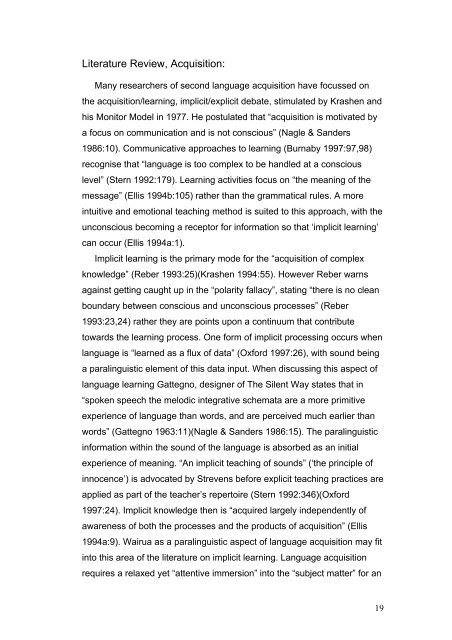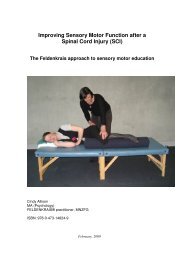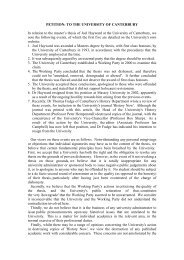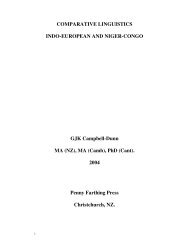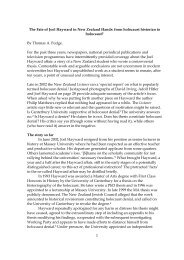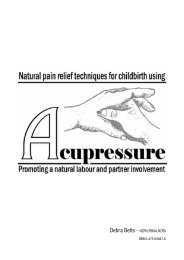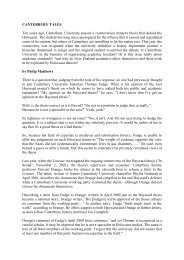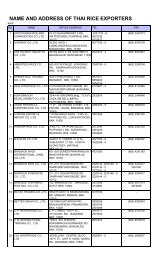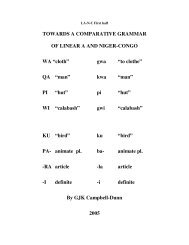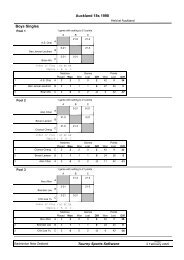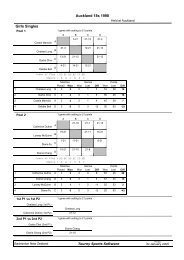Wairua and the relationship it has with learning te reo ... - Clear Net
Wairua and the relationship it has with learning te reo ... - Clear Net
Wairua and the relationship it has with learning te reo ... - Clear Net
Create successful ePaper yourself
Turn your PDF publications into a flip-book with our unique Google optimized e-Paper software.
L<strong>it</strong>erature Review, Acquis<strong>it</strong>ion:<br />
Many researchers of second language acquis<strong>it</strong>ion have focussed on<br />
<strong>the</strong> acquis<strong>it</strong>ion/<strong>learning</strong>, implic<strong>it</strong>/explic<strong>it</strong> deba<strong>te</strong>, stimula<strong>te</strong>d by Krashen <strong>and</strong><br />
his Mon<strong>it</strong>or Model in 1977. He postula<strong>te</strong>d that “acquis<strong>it</strong>ion is motiva<strong>te</strong>d by<br />
a focus on communication <strong>and</strong> is not conscious” (Nagle & S<strong>and</strong>ers<br />
1986:10). Communicative approaches to <strong>learning</strong> (Burnaby 1997:97,98)<br />
recognise that “language is too complex to be h<strong>and</strong>led at a conscious<br />
level” (S<strong>te</strong>rn 1992:179). Learning activ<strong>it</strong>ies focus on “<strong>the</strong> meaning of <strong>the</strong><br />
message” (Ellis 1994b:105) ra<strong>the</strong>r than <strong>the</strong> grammatical rules. A more<br />
intu<strong>it</strong>ive <strong>and</strong> emotional <strong>te</strong>aching method is su<strong>it</strong>ed to this approach, w<strong>it</strong>h <strong>the</strong><br />
unconscious becoming a receptor for information so that ‘implic<strong>it</strong> <strong>learning</strong>’<br />
can occur (Ellis 1994a:1).<br />
Implic<strong>it</strong> <strong>learning</strong> is <strong>the</strong> primary mode for <strong>the</strong> “acquis<strong>it</strong>ion of complex<br />
knowledge” (Reber 1993:25)(Krashen 1994:55). However Reber warns<br />
against getting caught up in <strong>the</strong> “polar<strong>it</strong>y fallacy”, stating “<strong>the</strong>re is no clean<br />
boundary between conscious <strong>and</strong> unconscious processes” (Reber<br />
1993:23,24) ra<strong>the</strong>r <strong>the</strong>y are points upon a continuum that contribu<strong>te</strong><br />
towards <strong>the</strong> <strong>learning</strong> process. One form of implic<strong>it</strong> processing occurs when<br />
language is “learned as a flux of data” (Oxford 1997:26), w<strong>it</strong>h sound being<br />
a paralinguistic element of this data input. When discussing this aspect of<br />
language <strong>learning</strong> Gat<strong>te</strong>gno, designer of The Silent Way sta<strong>te</strong>s that in<br />
“spoken speech <strong>the</strong> melodic in<strong>te</strong>grative schemata are a more prim<strong>it</strong>ive<br />
experience of language than words, <strong>and</strong> are perceived much earlier than<br />
words” (Gat<strong>te</strong>gno 1963:11)(Nagle & S<strong>and</strong>ers 1986:15). The paralinguistic<br />
information w<strong>it</strong>hin <strong>the</strong> sound of <strong>the</strong> language is absorbed as an in<strong>it</strong>ial<br />
experience of meaning. “An implic<strong>it</strong> <strong>te</strong>aching of sounds” (‘<strong>the</strong> principle of<br />
innocence’) is advoca<strong>te</strong>d by Strevens before explic<strong>it</strong> <strong>te</strong>aching practices are<br />
applied as part of <strong>the</strong> <strong>te</strong>acher’s repertoire (S<strong>te</strong>rn 1992:346)(Oxford<br />
1997:24). Implic<strong>it</strong> knowledge <strong>the</strong>n is “acquired largely independently of<br />
awareness of both <strong>the</strong> processes <strong>and</strong> <strong>the</strong> products of acquis<strong>it</strong>ion” (Ellis<br />
1994a:9). <strong>Wairua</strong> as a paralinguistic aspect of language acquis<strong>it</strong>ion may f<strong>it</strong><br />
into this area of <strong>the</strong> l<strong>it</strong>erature on implic<strong>it</strong> <strong>learning</strong>. Language acquis<strong>it</strong>ion<br />
requires a relaxed yet “at<strong>te</strong>ntive immersion” into <strong>the</strong> “subject mat<strong>te</strong>r” for an<br />
19


